Leaders of Influence
“My hope and prayer are that...the collaborations and partnerships we have formed in this emergency situation will lead to greater collaborations and partnerships on a permanent basis.”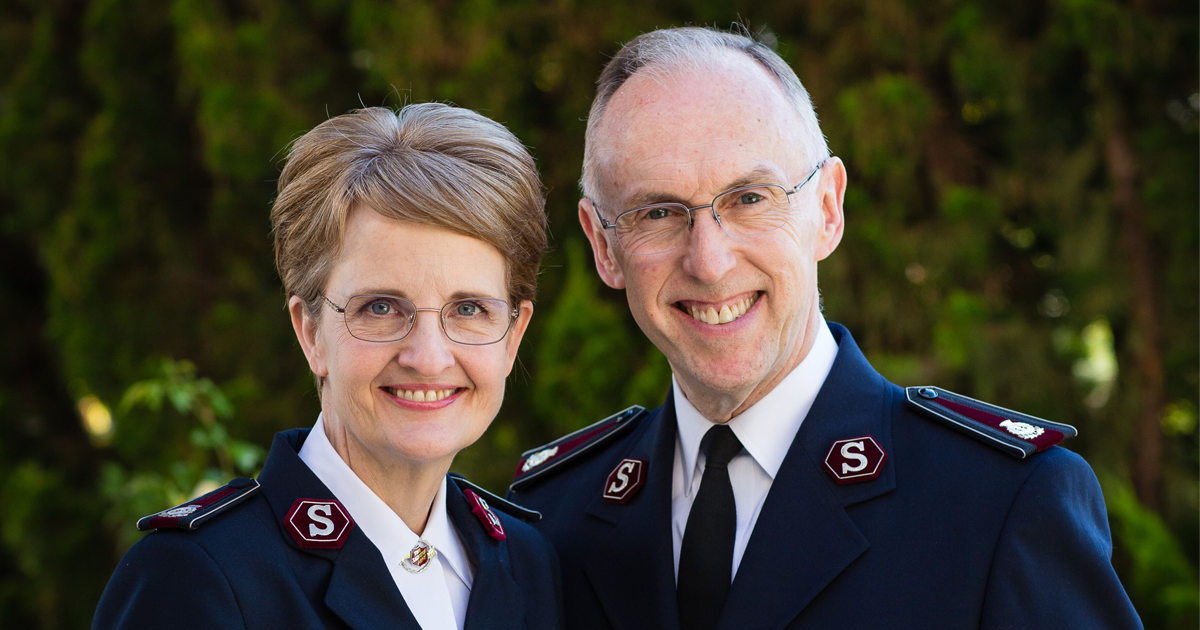
Commissioners Kenneth G. and Jolene Hodder become National Commander and National President of Women’s Ministries (respectively) on July 1. They talked to War Cry to discuss their hopes, guiding principles and what has prepared them for such a time as this.
You both have particular leadership styles. How would you describe yourself as a leader?
Jolene Hodder: My style is participatory. I always feel privileged to roll up my sleeves and serve alongside such amazing officers, soldiers and volunteers. Wherever I go I learn more from those I work with than I could ever imagine.
Kenneth Hodder: I would describe mine as adaptive. Over the last few months particularly, in light of COVID-19, I have had to adopt different approaches and mechanisms for leadership. Normally I would say my style is consultative, accompanied by a very active and one might say aggressive pursuit of the goals to which we all agree.
You’ve been heading the Western territory. Now you’ll be working with the commanders of the four territories together. What are you doing to prepare yourselves for that kind of role?
JH: I’m on my knees every morning, praying to the Lord for His direction.
KG: You have to change your mindset because each territory is a separate corporation with its own board of directors and responsibilities for their region of the country. The role at National Headquarters is more that of influence than command, involving more collaboration and promoting a cooperative environment and spirit so the Army can move forward in a united fashion.
I’m looking forward to representing the Army with the members of our National Advisory Board, at the federal government level, among corporations and foundations and with individuals across the country.
Commissioner Jolene, what are your thoughts about some of these changes that you’re seeing in Women’s Ministries worldwide?
JH: Ever since I entered training school, I have felt a special call to Women’s Ministries. I love what I do. My goal is to empower all women to be all that God has intended them to be. I do get concerned when Women’s Ministries are overlooked or considered “old school.” It’s a great ministry and we have some women who are incredibly capable. At the same time, there are women who feel called to other areas of service and we need to do what we can to grow them into leadership to give them training and opportunities. This is something we’re all needing to evaluate. Men and women are going to have to come together and find a way forward.
You’ve alluded to the fact that we’re dealing in a challenging environment. The diversity of populations and viewpoints are factors in forging agreement and shared goals. How do you keep track of what’s happening? What are you reading now? Who are some of your favorite authors?
KH: My reading habits tend toward history and theology. I try to read two to three books every month. Right now, I am reading Andrew Roberts’ biography of Churchill and Tim Keller’s book “Making Sense of God.” History helps me to understand the human element, which is common to all periods of history. And theology sharpens my mind in terms of how God might be leading the Army or leading me personally, at a particular time and place.
JH: My reading is very practical. I love the devotional “52 Greatest Stories of the Bible” by Kenneth Boa and John Alan Turner. Commissioner Robert Street is a great Army officer who writes on servant leadership. He’s very deep but very practical. I love reading books for our youth right now. “Young Hearts” by Bruce Ware is a theology book for children. By reading children’s books I turn around and make our faith relevant for the youth in our Army.
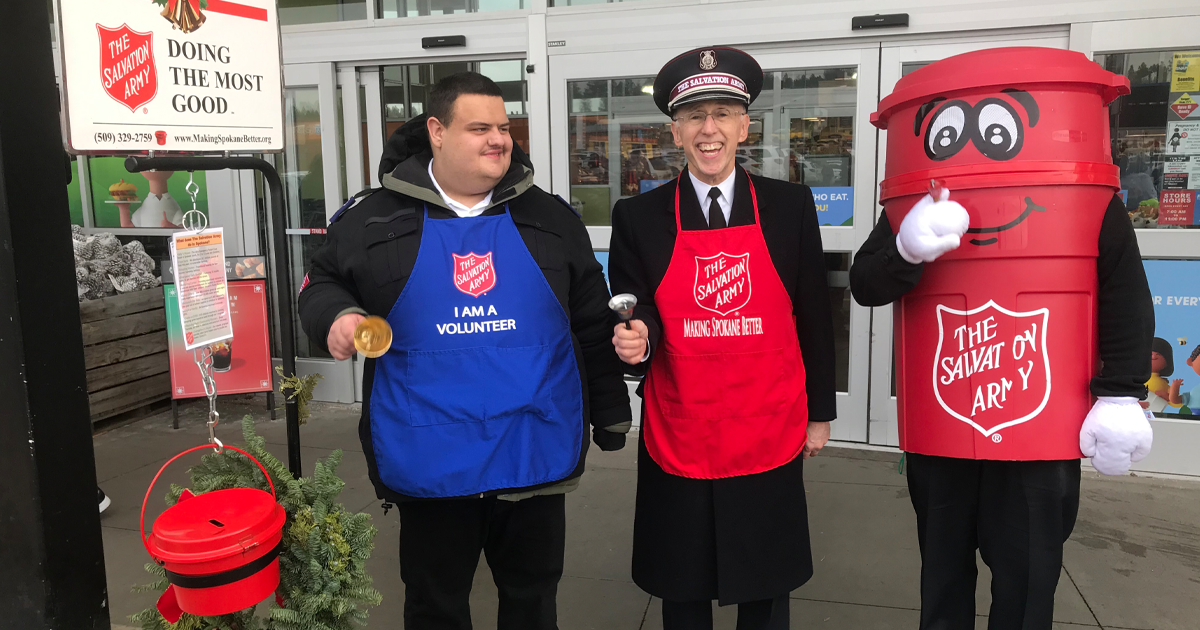
How has your service overseas changed your worldview in general and your understanding of the mission of The Salvation Army?
JH: People are so different and yet we’re the same. One of the things I learned is that love and respect go a long way in ministry. You can make a lot of mistakes—and believe me, I made a lot of mistakes living in a different culture. But when people know I love and respect them and want what is best for them, then they come alongside me through thick and thin. My husband’s grandfather said to me when we went into training, “You don’t have to be a good preacher. It’s not about how smart you are. None of that matters as long as your people know you love them.” That’s has been proven time and time again, especially when living in another culture where I didn’t know which way to turn. Love is what makes a difference.
KH: Before we went overseas for 11 years, we read a little book called “Foreign to Familiar” which describes different types of cultures. The author put cultures into two into baskets—hot and cool. I didn’t fully understand what she was trying to say at the time, but I discovered when we went overseas that she meant there are some cultures in which the individual is paramount and others in which community is paramount. I think I learned more about what the kingdom of God will be like as a consequence of living in Kenya because everything there is done in the context of community. Your first responsibility is to the community. Here in the west, the opportunities are considered to be individual. The emphasis is on individual salvation as opposed to the kingdom of God. It has broadened my understanding of scripture and the ways God works in different contexts.
That’s especially relevant now as we maintain social distancing while seeking new ways to overcome our separateness.
KH: Absolutely, right. Everything we do now is with our neighbor and mind. We’re learning a whole new language for what it means to love thy neighbor. It’s a language that involves masks and gloves and social distancing, but it’s a wake-up call in a sense of our responsibility for one another.
What do you most look forward to it with engaging as national leaders?
JH: I want to engage with everyone. I just can’t wait to meet the community and come alongside our partners.
KH: I’m looking forward to representing The Salvation Army with members of our National Advisory Board members, business and educational leaders from across the country. I’m looking forward to representing the Army at the federal government level, among corporations and foundations and individuals across the country. I find it a great privilege to be able to stand up and describe what the Army is, what we do and why we do it.
What experiences stand out to both of you in your own hearts and minds as something that personifies what The Salvation Army is all about?
JH: I’ll always remember this COVID-19 crisis. Our officers, employees, volunteers—everyone had a reason to stop working and stay safe—but instead so many of them have become community heroes. They’re working long hours on the frontlines to literally save and serve suffering humanity. They have found incredibly creative ways to minister to their communities. We are mobilized now more than ever. And we are reaching people for Christ more than ever and I’m just so proud of the Army.
KH: The Army can meet a full range of human need. It’s physical, emotional and spiritual. Early in this crisis, my wife and I were on the streets of Los Angeles handing out food to the homeless. As we walked down one particular row of homeless encampments, we came to one consisting of a blue tarp hung between a chain-link fence and a cement barrier. When we called out a man emerged from underneath the tarp. We chatted, I gave him a bag of food and he looked down and he said, “You know, today is my birthday.” One of the worst things about being homeless is that no one knows your name. So we quickly found a small cake and as we stood there with the sound of the freeway behind us and the tarp blowing in the wind my wife and I sang happy birthday to this homeless gentleman. That was an instance in which physical assistance was accompanied by a little word of encouragement and emotional support, and that for me is the Army.
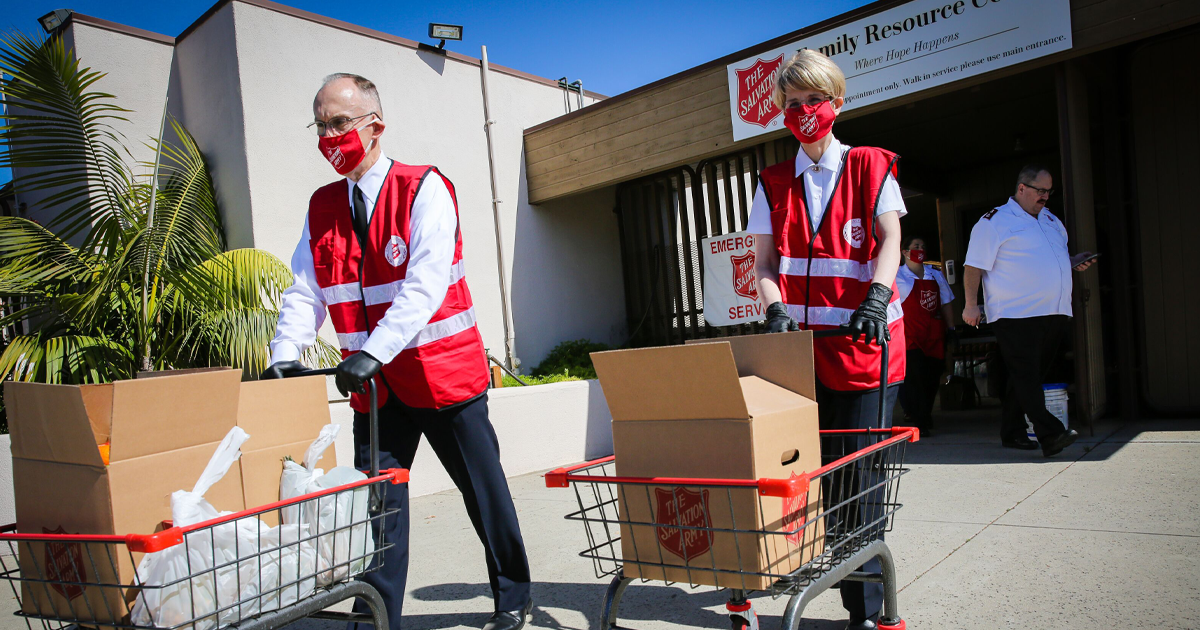
Who has influenced you through years?
JH: My mom and my dad who were officers. Every day they put on their uniform and lived out their loving service and sacrifice. Even as I graduated from college and went my own way and stopped going to the corps, I will never forget their role-modeling. That’s what kept me close to the Lord and it’s what brought me back to the Lord and to the Army.
KH: My answer would be the same. When you are the child of Salvation Army officers, you move so much that you have a unique opportunity to build strength in your family relationships, because home is wherever the family happens to be. If officers are conscious of that and make an intentional effort to encourage their children, to keep them close, their influence on their children is going to be massive. That was true in my own life as well.
How did you come to accept Jesus Christ as your Savior?
JH: I accepted Christ at a youth event during a territorial guard encampment on the Russian River in northern California. Barbara Hood preached a sermon and led me to the lord.
KH: I found Christ at the age of seven at the Oakland, CA Citadel Corps on a Sunday night. I was sitting in the back row and scribbling in a songbook and something about that night, and suddenly the message that was being said moved me. I went forward and knelt at the altar and under the loving guidance of my Father, I accepted Jesus Christ and it changed everything.
How do you envision helping the Army rise to the current challenges in terms of meeting human needs and dealing with the economic hardship?
KH: In a situation like this, which is really a disaster without edges, it affects everything. People’s foundation for their lives have been badly shaken. Everyone’s in transition and it is at those transitions that God can speak most powerfully because we realize that He is the only certainty. So, people reach out for it and the Army is beautifully positioned to make that clear in so many ways. We want to call the Army to be what God created it to be. There is no organization in the world of any kind in my judgment that can meet human need the way the Salvation Army can, based on our history, structure, personnel, training, experience and indeed the mission. As a consequence, we provide one of the greatest expressions of the gospel to people in need. That unique position is something my wife and I want to call Salvationists and those who support The Salvation Army to remember as we go forward.
The homeless initiative you have underway for the Western territory has really taken shape. Can you give us an update?
KH: The fact that we have hundreds of thousands of people living at the base of huge skyscrapers that symbolize the vibrancy of our commerce and industry in this country is inexcusable. The Army, which has been reaching out to the homeless for 155 years, simply cannot sit back and allow that to continue. Last year, we initiated a program called The Way Out. The goal was to double the Army’s impact on homelessness in the Western United States within five years. We’ve already surpassed it. In the course of the last year, and especially during this pandemic, the number of people we’re impacting who are homeless has absolutely exploded. We have cleared out thrift stores to provide safe housing for people who would otherwise be vulnerable on the streets. We are taking charge of hotels and motels, providing not only housing but food, support and encouragement to escape homelessness. My hope and my prayer are that the enormous acceleration in that effort which the COVID-19 crisis has created will last—that the collaborations and the partnerships we have formed in this emergency situation will lead to greater collaborations and partnerships on a permanent basis. We have governments at the city, county, state and federal levels now saying that the Army has proven it can do this and we want to work with them. There’s every reason to believe that the Salvation Army is going to renew its commitment across the country to those people who are at the very bottom of society who are the most forgotten and the most vulnerable, and that is precisely where we need to be.
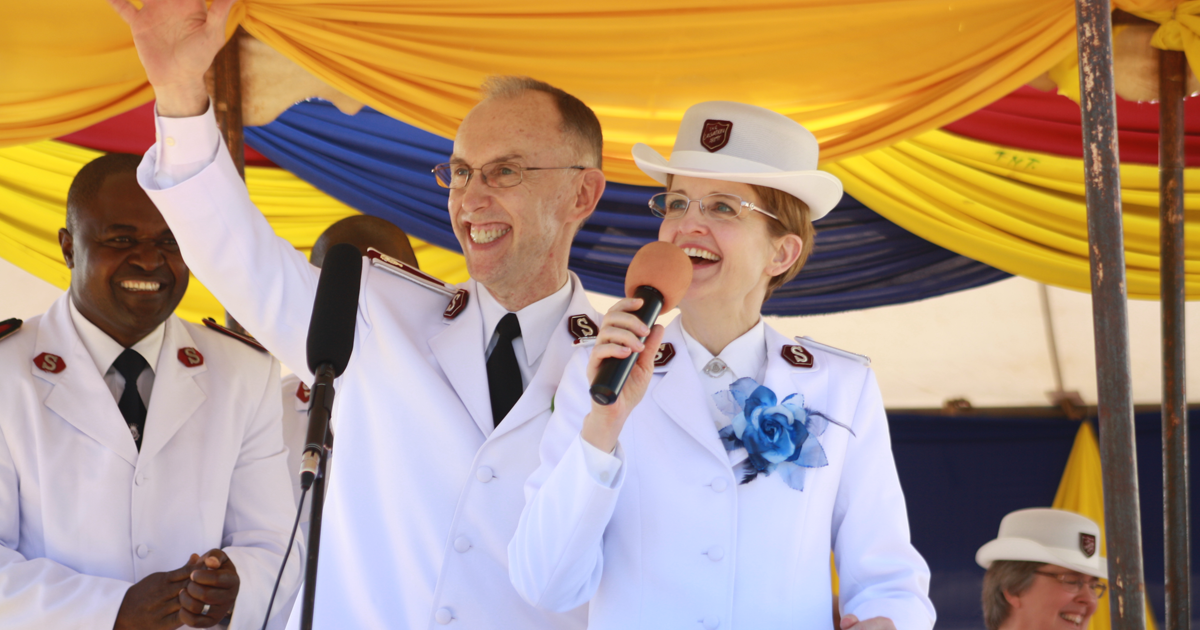
One of the great things about the Army is the ability to cross boundaries and promote the common good. What do you respect most about The Salvation Army’s tradition?
JH: Simply the ability to adapt to the needs of the community. I don’t know any other organization that really is as good as we are at just going in and finding out what needs to be done and rolling up our sleeves and doing the most good.
KH: First, I have always loved The Salvation Army’s high view of discipleship. We understand discipleship to be an all-encompassing endeavor that should touch every part of who we are. The Salvationist is not limited to worship on Sundays, we’re not limited to a particular style of worship, we’re not limited to a particular area of endeavor or service. Discipleship is everything for us. Second, I have always respected is the attitude of self-sacrifice. The Army wants everyone, particularly, its officers, to be imbued with the notion of sacrificing themselves for the gospel. That, I think, is one of the greatest Salvationist traditions and I want to see that emphasized in the years to come.
What would you both like to see the Salvation Army take on as challenges and opportunities for growth?
JH: I want to see more women and minorities trained and ready for top leadership positions. I think that we have a great way to go in that and if we can help people be all they are meant to be in Christ Jesus, there isn’t anything that this Army can’t do.
KH: I would agree with that. The opportunities for our leadership development are enormous. But if that’s part of something larger—a willingness on the part of Salvationists to change, an openness to new ways of doing things, an openness to exploring things we’ve never done before. I would like to see the Army embrace change as it embraced innovation in its early days.
With your skills, education and background, you both could have taken different paths in life. How has God led and sustained you and how do you stay connected with Him?
JH: When I look at my life and there’s just been one blessing and one adventure after another. The Lord’s been so incredibly good to me. Every morning I spend time with Him. Whenever I start to feel sorry for myself or worry about the future, I just look back and I see the stepstones of His blessings and that’s what sustains me.
KH: I have always enjoyed brother Lawrence’s “Practice of the Presence of God,” to live in constant awareness of prayer and constant awareness of the world that He has created. I stay connected to God by trying to be alert to all the things that happen and say little prayers throughout the day, to ask constantly to sacrifice myself for the good of the gospel. I find that a wonderfully enriching way to live and that has sustained me countless times over my life.
Is there anything else on your hearts that you would like to say?
KH: if there’s one thing we would want people to know is that God loves you, He cares about every part of your life. He’s concerned about everything that concerns you and we would not want to end this interview without reminding you of the fact that God is there to forgive you. He’s there to welcome you as His child. He’s there with a life that is better than any other you could ever imagine or plan for yourself. What it says in John 3:16 is as true now as it ever was, “God so loved the world that He gave His only son so that whoever believes in Him should not perish but have everlasting life.”
JH: Amen.
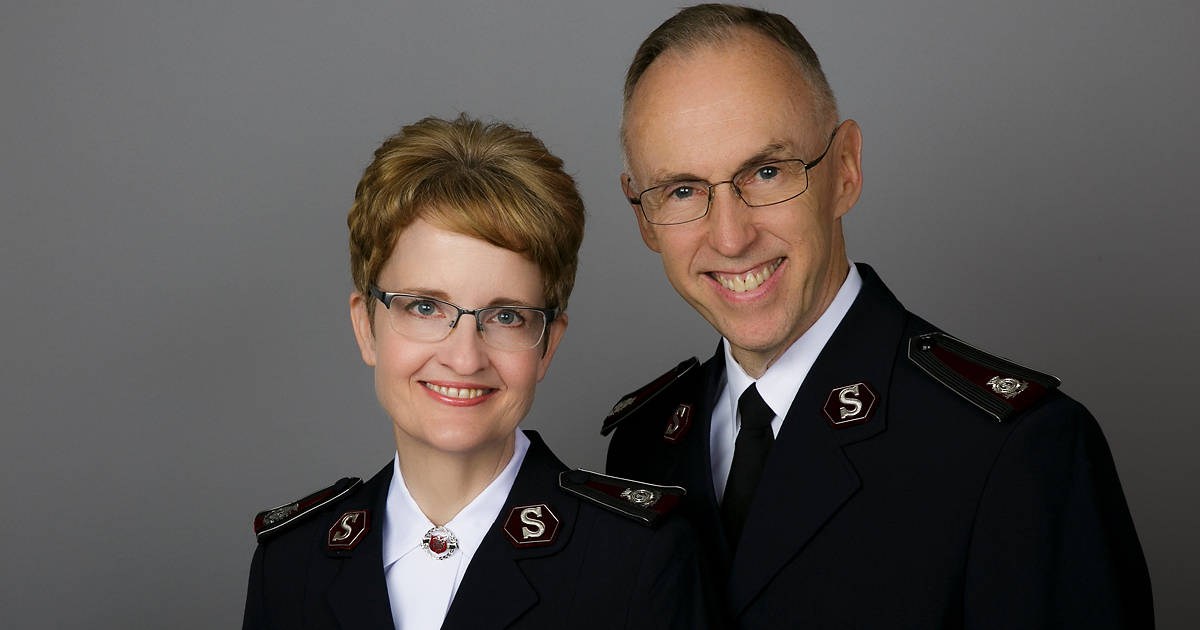
About the Hodders
Commissioned as officers in in 1988, Kenneth G. and Jolene Hodder served in corps appointments in Glendale and Torrance, CA, as instructors at the school for officers training and later as staff officers at U.S. Western Territorial Headquarters. In 1997, they were appointed to Atlanta, GA, for three years as coordinators for the International Millennial Congress. Subsequently, they served at Southern California Divisional Headquarters in Los Angeles and then as divisional leaders for the Cascade Division.
The Hodders were appointed to serve in the Kenya Territory in 2006. As chief secretary, Kenneth Hodder assumed operational responsibility for the creation of the Kenya East and Kenya West territories. Three years later, the Hodders were appointed to International Headquarters, where he served as international secretary for Personnel and as legal and constitutional adviser to the General. He also served on the International Moral and Social Issues Council. Jolene Hodder served as associate international secretary for personnel and as secretary to the chief’s business session. They were subsequently appointed as the territorial leaders for Kenya West in January 2013, serving there until becoming leaders of the U.S. Western Territory in 2017. Commissioner Kenneth Hodder is a graduate of Harvard College and Harvard Law School. Commissioner Jolene Hodder graduated from California State University, Los Angeles, with a degree in home economics.







